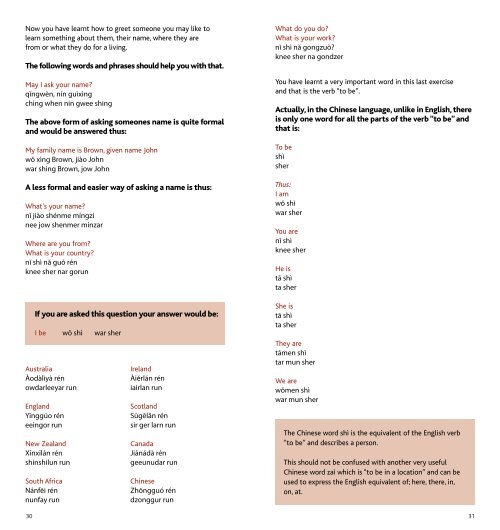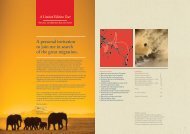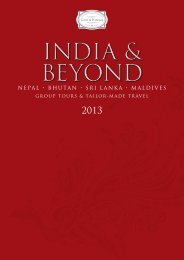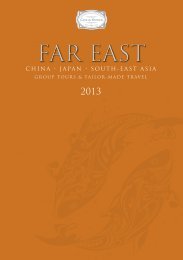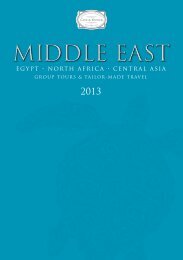YOUR PHRASEBOOK - Travel Club Elite
YOUR PHRASEBOOK - Travel Club Elite
YOUR PHRASEBOOK - Travel Club Elite
You also want an ePaper? Increase the reach of your titles
YUMPU automatically turns print PDFs into web optimized ePapers that Google loves.
Now you have learnt how to greet someone you may like to<br />
learn something about them, their name, where they are<br />
from or what they do for a living.<br />
The following words and phrases should help you with that.<br />
May I ask your name?<br />
qĭngwèn, nín guìxìng<br />
ching when nin gwee shing<br />
The above form of asking someones name is quite formal<br />
and would be answered thus:<br />
My family name is Brown, given name John<br />
wŏ xìng Brown, jiào John<br />
war shing Brown, jow John<br />
A less formal and easier way of asking a name is thus:<br />
What’s your name?<br />
nĭ jiào shénme míngzi<br />
nee jow shenmer minzar<br />
Where are you from?<br />
What is your country?<br />
nĭ shì nă guó rén<br />
knee sher nar gorun<br />
If you are asked this question your answer would be:<br />
I be wŏ shì war sher<br />
Australia<br />
Àodàlìyà rén<br />
owdarleeyar run<br />
England<br />
Yīnggúo rén<br />
eeingor run<br />
New Zealand<br />
Xīnxīlán rén<br />
shinshilun run<br />
South Africa<br />
Nánfēi rén<br />
nunfay run<br />
Ireland<br />
Àiĕrlán rén<br />
iairlan run<br />
Scotland<br />
Sūgēlăn rén<br />
sir ger larn run<br />
Canada<br />
Jiānádà rén<br />
geeunudar run<br />
Chinese<br />
Zhōngguó rén<br />
dzonggur run<br />
What do you do?<br />
What is your work?<br />
nĭ shì nă gongzuò?<br />
knee sher na gondzer<br />
You have learnt a very important word in this last exercise<br />
and that is the verb “to be”.<br />
Actually, in the Chinese language, unlike in English, there<br />
is only one word for all the parts of the verb “to be” and<br />
that is:<br />
To be<br />
shì<br />
sher<br />
Thus:<br />
I am<br />
wŏ shì<br />
war sher<br />
You are<br />
nĭ shì<br />
knee sher<br />
He is<br />
tā shì<br />
ta sher<br />
She is<br />
tā shì<br />
ta sher<br />
They are<br />
tāmen shì<br />
tar mun sher<br />
We are<br />
wŏmen shì<br />
war mun sher<br />
The Chinese word shì is the equivalent of the English verb<br />
“to be” and describes a person.<br />
This should not be confused with another very useful<br />
Chinese word zaì which is “to be in a location” and can be<br />
used to express the English equivalent of; here, there, in,<br />
on, at.<br />
30 31


